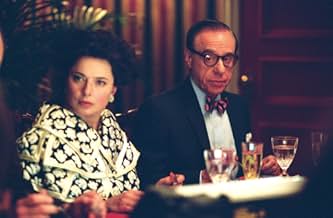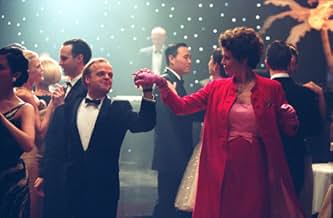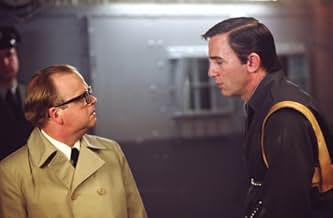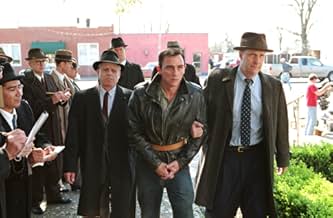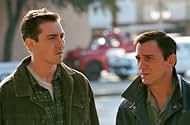While researching his novel "In Cold Blood", Truman Capote develops a close relationship with convicted murderers Dick Hickock and Perry Smith.While researching his novel "In Cold Blood", Truman Capote develops a close relationship with convicted murderers Dick Hickock and Perry Smith.While researching his novel "In Cold Blood", Truman Capote develops a close relationship with convicted murderers Dick Hickock and Perry Smith.
- Director
- Writers
- Stars
- Awards
- 3 wins & 2 nominations total
Frank G. Curcio
- William Shawn
- (as Frank Curcio)
Terri Merritt Bennett
- D.A.'s Secretary
- (as Terri Bennett)
- Director
- Writers
- All cast & crew
- Production, box office & more at IMDbPro
Featured reviews
Infamous has a difficult comparison with the earlier "Capote." Still it is a different view of the same story and characters and is written with more emphasis on the perspectives of those who knew, or thought they knew, Capote. Toby Jones may not fully match the nuanced performance of Philip Seymour Hoffman but he does, possibly, a better imitation of Capote. Infamous has a better known cast of supporting players and they do a creditable job. Sandra Bullock's Harper Lee isn't the quite same as that portrayed so well by Catherine Keener in "Capote" but her character blends perfectly with the tone of "Infamous." Daniel Craig adds another fine acting turn as the "In Cold Blood" killer who receives the most attention. Even Gwyneth Paltrow makes an excellent impression in a brief opening scene as, apparently, singer Peggy Lee. (In the showing I saw, she was introduced as "Kitty Dean???") I wondered why another version of this story was filmed and it may not do well after the success of "Capote" but I was surprisingly entertained and intrigued by this movie.
"There will be time to murder and create." T.S. Eliot's Prufrock
Truman Capote described murderer Perry Smith as between the "tender and the terrible." Such may be said about writer/director Douglas McGrath's superior Infamous, a tale of Truman Capote's (Toby Jones) love affair with his innovative novelization, In Cold Blood, and its protagonist,Perry Smith (Daniel Graig). The tender is Capote's love of his female friends, especially Harper Lee (Sandra Bullock) and Smith (DanielCraig), and the terrible slaughter of the Kansas farm family in 1959 by Smith and friend Dick Hickock (Lee Pace).
Inevitable as accusing Toby Jones of only imitating Capote is the comparison with Philip Seymour Hoffman's Oscar performance of the titular author in Capote (1955). Jones's turn is more complex than Hoffman's, alternating between Capote's imaginative connection with the crime and his growing respect, even love, for Smith. In fact, the well-known love between the men is avoided in Capote but highlighted in Infamous.
I was hooked in the first sequence, when Gwyneth Paltrow as Peggy Lee sings "What is this thing called love?" and breaks down in apparent awareness of her own losses. The song, perfect for the themes of the film, and the film's score carry a melancholy with them that McGrath captures in Tru's constantly frustrated search for truth and love and Lee's inability to pen another novel after her Pulitzer-Prize-winning To Kill a Mockingbird. For that matter, Capote never completes a significant piece after that himself.
Last year's Capote seemed centered on the conflict in Truman over whether or not he was exploiting Smith to get a story and then never fully engaging a campaign to free them. This year's Infamous (a poor title regardless of it double artistic appropriateness) is more interested in Truman's struggle to write a new kind of fiction (docudrama) and his true affection for Smith. Infamous fleshes out the story and the fabulous artist whose "Breakfast at Tiffany's" and "In Cold Blood" are cultural staples of 20th century life.
Truman Capote described murderer Perry Smith as between the "tender and the terrible." Such may be said about writer/director Douglas McGrath's superior Infamous, a tale of Truman Capote's (Toby Jones) love affair with his innovative novelization, In Cold Blood, and its protagonist,Perry Smith (Daniel Graig). The tender is Capote's love of his female friends, especially Harper Lee (Sandra Bullock) and Smith (DanielCraig), and the terrible slaughter of the Kansas farm family in 1959 by Smith and friend Dick Hickock (Lee Pace).
Inevitable as accusing Toby Jones of only imitating Capote is the comparison with Philip Seymour Hoffman's Oscar performance of the titular author in Capote (1955). Jones's turn is more complex than Hoffman's, alternating between Capote's imaginative connection with the crime and his growing respect, even love, for Smith. In fact, the well-known love between the men is avoided in Capote but highlighted in Infamous.
I was hooked in the first sequence, when Gwyneth Paltrow as Peggy Lee sings "What is this thing called love?" and breaks down in apparent awareness of her own losses. The song, perfect for the themes of the film, and the film's score carry a melancholy with them that McGrath captures in Tru's constantly frustrated search for truth and love and Lee's inability to pen another novel after her Pulitzer-Prize-winning To Kill a Mockingbird. For that matter, Capote never completes a significant piece after that himself.
Last year's Capote seemed centered on the conflict in Truman over whether or not he was exploiting Smith to get a story and then never fully engaging a campaign to free them. This year's Infamous (a poor title regardless of it double artistic appropriateness) is more interested in Truman's struggle to write a new kind of fiction (docudrama) and his true affection for Smith. Infamous fleshes out the story and the fabulous artist whose "Breakfast at Tiffany's" and "In Cold Blood" are cultural staples of 20th century life.
When I saw "Capote" I was really impressed by the presentation of the story and the quality of the acting. When I saw "Infamous" today, I was caught up with the story in a way I had not been before. It was closer to the experience when I read the book many,many years ago. "In Cold Blood" is about killing human beings, and I believe that it is no more right for cold blooded murders to do it than for me do do it as a member of society that authorizes the death penalty. I believe that the film as well as the book makes people think about this issue The cast was superb, and I said the same about the earlier rendition, but this time the characters were fully developed and believable under the circumstances. I had been impressed before, but this film is different from the last--it is more emotional, more detailed in rendition of the characters, and more interested in showing not just the destruction of Truman Capote, but in sharing the ideas that he expressed in "In Cold Blood".
When I was growing up (I am 62 now) I recall that I did not like Capote when I saw him on talk shows repeatedly. I really knew nothing of gay culture or what even that meant at the time, so it had nothing to do with the sexual orientation. It had to do with the ego that was constantly expressed and realted to nothing that I really cared about.
But what was incredibly important to me then and now is that we can lose track of the fact that we are all human beings, a point that was stressed in the film. Killers may be killers, but they are us, in a way, filled with some of the same ambitions, hates, emotions that most of us can control. What separates us from them might not be very much, so why do we need to kill them as they jailed their victims? It is easy to kill, but not so easy to try to understand. This film hits an emotional level that the previous film did not. I am pleased that it ultimately was made. I am also pleased that the quality of the performances, the writing and most especially the direction, were so superb. Watch the scene where the farmer speaks only to Harper Lee and not Capote. It is an incredible monologue, but the circumstances are noted.
When I was growing up (I am 62 now) I recall that I did not like Capote when I saw him on talk shows repeatedly. I really knew nothing of gay culture or what even that meant at the time, so it had nothing to do with the sexual orientation. It had to do with the ego that was constantly expressed and realted to nothing that I really cared about.
But what was incredibly important to me then and now is that we can lose track of the fact that we are all human beings, a point that was stressed in the film. Killers may be killers, but they are us, in a way, filled with some of the same ambitions, hates, emotions that most of us can control. What separates us from them might not be very much, so why do we need to kill them as they jailed their victims? It is easy to kill, but not so easy to try to understand. This film hits an emotional level that the previous film did not. I am pleased that it ultimately was made. I am also pleased that the quality of the performances, the writing and most especially the direction, were so superb. Watch the scene where the farmer speaks only to Harper Lee and not Capote. It is an incredible monologue, but the circumstances are noted.
Everyone's seen the 2005 drama Capote, which won Phillip Seymour Hoffman his Best Actor Oscar, but how many people have seen Infamous, the exact same story filmed at the exact same time but was held back a year because the other made earlier festival deadlines? If you've only seen Hoffman's performance, you owe it to Toby Jones and everyone who put their talent into the later film to rent Infamous.
I've seen them both, and there's a remarkable difference. Capote bored me to tears; I actually nodded off to sleep a couple of times. I barely remembered the sequence of scenes, and in fact, when I watched Infamous, some of the events were a surprise to me even though I was supposed to have seen them before. The 2006 film was entertaining, riveting, and many of the scenes will stay in my memory forever. Writer-director Douglas McGrath delivered his specialty: fast-paced, witty, emotional, and complex.
To pay homage to the true crime genre pioneered by Truman Capote's In Cold Blood, McGrath made his film a combination of dramatic fiction and mockumentary. Interview testimony from Capote's friends (Sigourney Weaver, Sandra Bullock, Peter Bogdanovich, Juliet Stevenson, John Benjamin Hickey, Jeff Daniels, and Isabella Rossellini) is intercut with scenes that drive the plot forward. Just as Capote alters the truth to suit his writing, McGrath adds fictional elements to the plot. This is, simply put, the greatest tribute to Truman Capote's writing style.
While the plot itself isn't my usual fare, I always love watching movies that feature fantastic performances. I don't like grizzly murder mysteries, and I'll admit to looking away from the television set during the gruesome scenes. In both films, Truman Capote is inspired to write the first true crime novel by a terrible small-town murder. He travels with his writer pal Harper Lee to interview the townsfolk, and he ends up spending a great deal of time talking with the murderers in prison. Does the brooding criminal who guards his words carefully look familiar? Probably not, but wash off the brunette rinse, take out the brown contacts, and replace the American accent with an English one. . . The same year Daniel Craig made a splash in his first James Bond flick, he was also in Infamous - and he was fantastic. Don't feel bad if you don't recognize him and have a, "Where's Fredric March?" moment. A large part of the story is Capote's quest to humanize the murderers, and the scenes between Jones and Craig are multifaceted and extremely well-acted.
If you don't really know who Truman Capote is, you'll love Phillip Seymour Hoffman's portrayal. He's the guy that dresses and talks funny, right? If you actually remember the "eccentric" author, you'll continually pinch yourself as you watch Toby Jones. It was an effort to keep reminding myself that I wasn't actually watching Truman Capote spliced alongside modern actors. In some scenes, he personifies "light in the loafers" and passes gossip amongst his friends for entertainment; in others, he's so emotionally conflicted the audience is free to take their own interpretation. Depending on your point of view, you can see Capote as a selfish manipulator consumed by his novel, or a tormented soul who desperately wants to create a fictional world to improve what really happened. Since both sides can be argued, Toby Jones is remarkable.
In a major chunk of the film, Jones is challenged by Craig's reluctance to share his story. The other murderer, Lee Place, is very open, but Craig maintains he's a human being, not a character in a story. Years ago, I took a directing course that focused on working with actors. Our assignment during each scene was to write out a different motivation behind every line of dialogue, to help our actors give better performances. In Infamous, Jones runs through every conceivable motivation as he tries to figure out what will make Craig trust him enough to open up about his feelings. He offers logic, money, and emotional blackmail; he sends him different types of literature to read in his cell; he makes any number of promises about the tone he'll take with the book and shares his own sad stories. It's both exhausting and interesting to watch.
Jones perfects the art of finding out what each person in his life needs and giving it to them, but is the mere satisfaction of being a chameleon enough? He gives a little smirk at the time, but as the high fades, he needs either more or different to keep him happy. In one scene, he breaks down in exhaustion and confesses to his friends that the years have taken their toll. Just as you think he's going to reveal his true feelings, he offers a comment on his book instead. It's one of his many moments of brilliance that keep you in a constant state of unease.
Rent Infamous. It'll surprise you. Sandra Bullock masters the Alabama accent, which you know is no small feat if you've ever studied different dialects. Daniel Craig is unrecognizable, and Toby Jones is perfect. I could write pages praising Toby Jones's performance, but I couldn't say it any better than Rex Reed did in The New York Observer: "They gave the Oscar to the wrong Truman Capote. ... (Hoffman) was doing an impression. In Infamous ... a diminutive actor with a titanic talent named Toby Jones literally becomes the man himself. This is no lisping impersonation learned from watching old Johnny Carson shows: Mr. Jones moves into Truman's skin, heart, and brains. Infamous shows you the man's soul."
Kiddy Warning: Obviously, you have control over your own children. However, due to violence and adult content, I wouldn't let my kids see it.
I've seen them both, and there's a remarkable difference. Capote bored me to tears; I actually nodded off to sleep a couple of times. I barely remembered the sequence of scenes, and in fact, when I watched Infamous, some of the events were a surprise to me even though I was supposed to have seen them before. The 2006 film was entertaining, riveting, and many of the scenes will stay in my memory forever. Writer-director Douglas McGrath delivered his specialty: fast-paced, witty, emotional, and complex.
To pay homage to the true crime genre pioneered by Truman Capote's In Cold Blood, McGrath made his film a combination of dramatic fiction and mockumentary. Interview testimony from Capote's friends (Sigourney Weaver, Sandra Bullock, Peter Bogdanovich, Juliet Stevenson, John Benjamin Hickey, Jeff Daniels, and Isabella Rossellini) is intercut with scenes that drive the plot forward. Just as Capote alters the truth to suit his writing, McGrath adds fictional elements to the plot. This is, simply put, the greatest tribute to Truman Capote's writing style.
While the plot itself isn't my usual fare, I always love watching movies that feature fantastic performances. I don't like grizzly murder mysteries, and I'll admit to looking away from the television set during the gruesome scenes. In both films, Truman Capote is inspired to write the first true crime novel by a terrible small-town murder. He travels with his writer pal Harper Lee to interview the townsfolk, and he ends up spending a great deal of time talking with the murderers in prison. Does the brooding criminal who guards his words carefully look familiar? Probably not, but wash off the brunette rinse, take out the brown contacts, and replace the American accent with an English one. . . The same year Daniel Craig made a splash in his first James Bond flick, he was also in Infamous - and he was fantastic. Don't feel bad if you don't recognize him and have a, "Where's Fredric March?" moment. A large part of the story is Capote's quest to humanize the murderers, and the scenes between Jones and Craig are multifaceted and extremely well-acted.
If you don't really know who Truman Capote is, you'll love Phillip Seymour Hoffman's portrayal. He's the guy that dresses and talks funny, right? If you actually remember the "eccentric" author, you'll continually pinch yourself as you watch Toby Jones. It was an effort to keep reminding myself that I wasn't actually watching Truman Capote spliced alongside modern actors. In some scenes, he personifies "light in the loafers" and passes gossip amongst his friends for entertainment; in others, he's so emotionally conflicted the audience is free to take their own interpretation. Depending on your point of view, you can see Capote as a selfish manipulator consumed by his novel, or a tormented soul who desperately wants to create a fictional world to improve what really happened. Since both sides can be argued, Toby Jones is remarkable.
In a major chunk of the film, Jones is challenged by Craig's reluctance to share his story. The other murderer, Lee Place, is very open, but Craig maintains he's a human being, not a character in a story. Years ago, I took a directing course that focused on working with actors. Our assignment during each scene was to write out a different motivation behind every line of dialogue, to help our actors give better performances. In Infamous, Jones runs through every conceivable motivation as he tries to figure out what will make Craig trust him enough to open up about his feelings. He offers logic, money, and emotional blackmail; he sends him different types of literature to read in his cell; he makes any number of promises about the tone he'll take with the book and shares his own sad stories. It's both exhausting and interesting to watch.
Jones perfects the art of finding out what each person in his life needs and giving it to them, but is the mere satisfaction of being a chameleon enough? He gives a little smirk at the time, but as the high fades, he needs either more or different to keep him happy. In one scene, he breaks down in exhaustion and confesses to his friends that the years have taken their toll. Just as you think he's going to reveal his true feelings, he offers a comment on his book instead. It's one of his many moments of brilliance that keep you in a constant state of unease.
Rent Infamous. It'll surprise you. Sandra Bullock masters the Alabama accent, which you know is no small feat if you've ever studied different dialects. Daniel Craig is unrecognizable, and Toby Jones is perfect. I could write pages praising Toby Jones's performance, but I couldn't say it any better than Rex Reed did in The New York Observer: "They gave the Oscar to the wrong Truman Capote. ... (Hoffman) was doing an impression. In Infamous ... a diminutive actor with a titanic talent named Toby Jones literally becomes the man himself. This is no lisping impersonation learned from watching old Johnny Carson shows: Mr. Jones moves into Truman's skin, heart, and brains. Infamous shows you the man's soul."
Kiddy Warning: Obviously, you have control over your own children. However, due to violence and adult content, I wouldn't let my kids see it.
"INFAMOUS" ~~ THE OTHER BETTER CAPOTE ... Directed by Douglas McGrath who also wrote the screenplay for Woody Allen's "Bullets Over Broadway" (1994) and directed Paltrow in Jane Austen's "Emma", 1996. Starring Toby Jones as Truman Capote -- one of those rare cases where the actor did not "play" the role but completely entered the skin of the real life character in question. Incredibly "Infamous" was on last night on Hungarian TV, Dubbed into Hungarian but I watched it anyway, for the body language and Production values. And the general feeling of the movie. I had forgotten what an important role a deglamourised Sandra Bullock had in this picture as Capote's constant companion throughout. But the fact that this major Hollywood star was content to take a supporting role to an unknown British actor is a real mark of her professionalism. Interestingly, she smokes in just about every scene she's in, which I assume was just for the requirements of the picture. Toby Jones is head and shoulders better than Seymour Hoffman was in the role, Besides the fact that he is a dead ringer for minuscule real life Capote whereas Bulky Seymour wasn't even close. If there were anything resembling integrity In the Hollywood film world, Jones should have been a walkaway for best actor in 2007 and Bullock would have been a very worthy candidate for Best Supporting actress, female -- Come to think of it, they oughta have a special slot for "Best supporting role by a star leading actor/actress willing to take a back seat" in a quality picture.
I saw "Infamous" at the 2006 Venice film festival and recognized it then as an unsung masterpiece, far far better than the Hoffman caricature earlier the same year. It opens with an incredible turn by Gwyneth Paltrow in a long white gown as Peggy Lee doing the old standard "This must Be Love" -- but she is so touched by the inherent sadness of the song that she breaks down in the middle and has to stop. What an opener! ~ possibly the best single scene Paltrow has ever done. Which sets the tone for everything to come.
A series of interviews follows with celebrity contemporaries of Capote speaking to the camera and identified by name with on screen titles which gives the picture a documentary feel, but the name celebrities are themselves celebrity actors such as Sigourney Weaver and especially, Peter Bogdanovich as Bennet Cerf. I think this is definitely one of the very best pictures of the Decade, 2000- 2010, and one that I would like to own so I could watch it over and over. And don't forget Daniel Craig (later to be Dubble 007!) as death row killer Perry Smith who Capote falls in love with! The prison interviews are filmed in a kind of chiaro-oscuro and the 1959 Period atmosphere is unobtrusively authentic-- without parading collectors vintage cars across the screen in every outdoor scene.
"Infamous", 2006, is a true gem in every respect but fell between the cracks because it was overshadowed by the hullabaloo over the distinctly inferior Sony Pictures production -- a classic case of the triumph of publicity over Quality.
I saw "Infamous" at the 2006 Venice film festival and recognized it then as an unsung masterpiece, far far better than the Hoffman caricature earlier the same year. It opens with an incredible turn by Gwyneth Paltrow in a long white gown as Peggy Lee doing the old standard "This must Be Love" -- but she is so touched by the inherent sadness of the song that she breaks down in the middle and has to stop. What an opener! ~ possibly the best single scene Paltrow has ever done. Which sets the tone for everything to come.
A series of interviews follows with celebrity contemporaries of Capote speaking to the camera and identified by name with on screen titles which gives the picture a documentary feel, but the name celebrities are themselves celebrity actors such as Sigourney Weaver and especially, Peter Bogdanovich as Bennet Cerf. I think this is definitely one of the very best pictures of the Decade, 2000- 2010, and one that I would like to own so I could watch it over and over. And don't forget Daniel Craig (later to be Dubble 007!) as death row killer Perry Smith who Capote falls in love with! The prison interviews are filmed in a kind of chiaro-oscuro and the 1959 Period atmosphere is unobtrusively authentic-- without parading collectors vintage cars across the screen in every outdoor scene.
"Infamous", 2006, is a true gem in every respect but fell between the cracks because it was overshadowed by the hullabaloo over the distinctly inferior Sony Pictures production -- a classic case of the triumph of publicity over Quality.
Did you know
- TriviaThis film appeared not long after the film Truman Capote (2005). While Infamous goes deeper into the background of the killers, Capote focuses intensely on the relationship between Capote and Smith. As such, the two films could be considered to be companion pieces.
- GoofsEarly in the movie Harper Lee and Capote order drinks in a Holcomb, Kansas restaurant. At the time of the movie's action, Kansas was dry as a bone. You couldn't buy a drink in a Kansas restaurant until state liquor laws began to change in the mid '80s.
- Quotes
Truman Capote: Imagine being told your work lacked kindness by a four-time killer!
- How long is Infamous?Powered by Alexa
Details
- Release date
- Country of origin
- Official site
- Language
- Also known as
- Infamous
- Filming locations
- Marlin, Texas, USA(Courthouse exterior and interior scenes)
- Production companies
- See more company credits at IMDbPro
Box office
- Budget
- $13,000,000 (estimated)
- Gross US & Canada
- $1,151,330
- Opening weekend US & Canada
- $452,966
- Oct 15, 2006
- Gross worldwide
- $2,689,799
- Runtime
- 1h 50m(110 min)
- Color
- Sound mix
- Aspect ratio
- 1.85 : 1
Contribute to this page
Suggest an edit or add missing content





